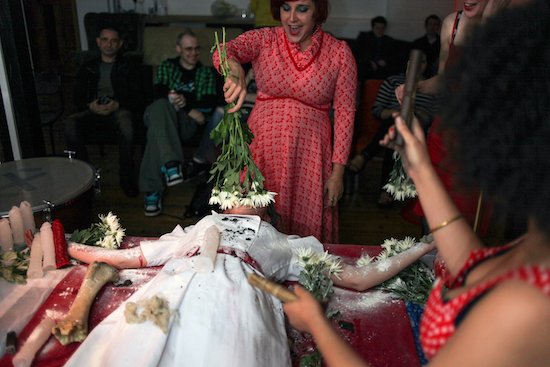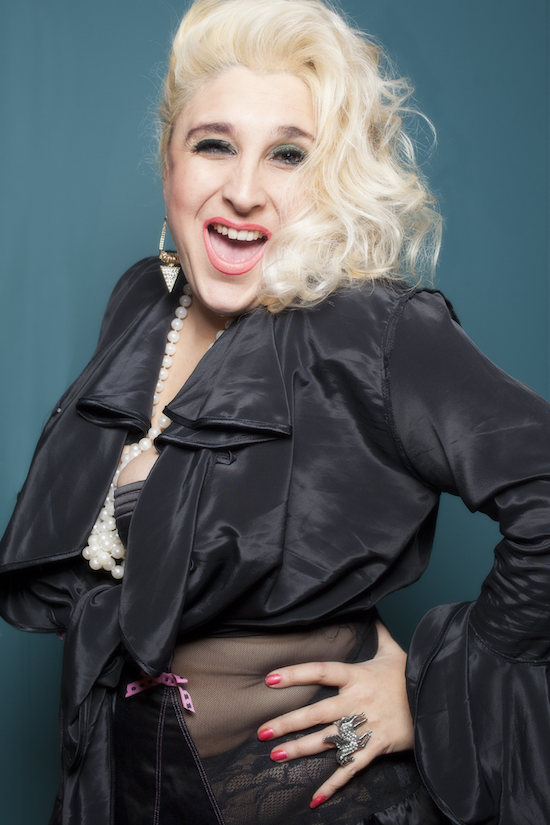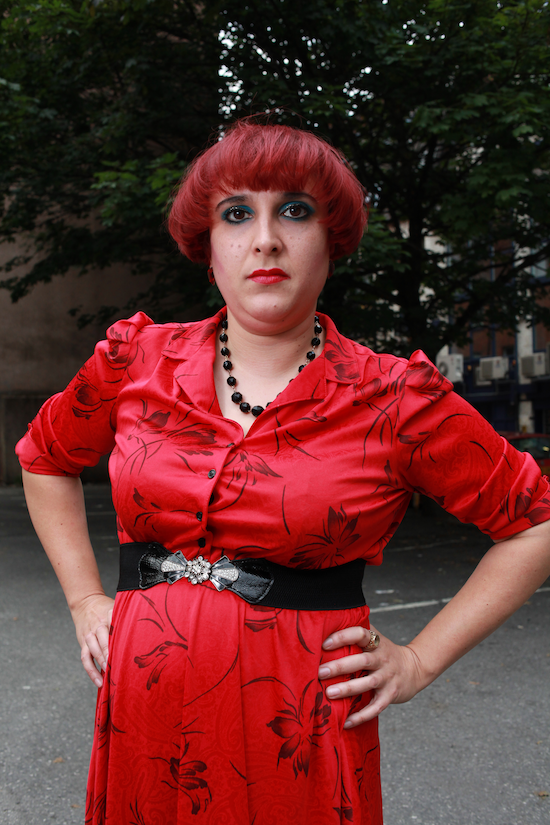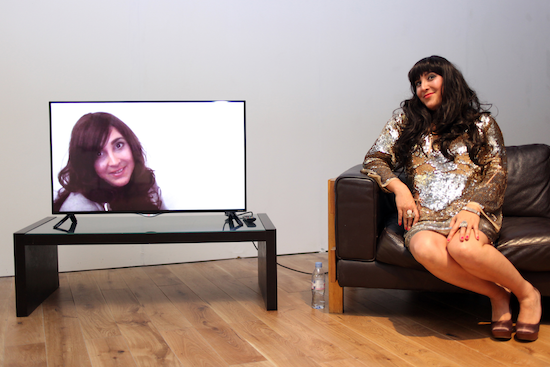All photographs courtesy of Lee Baxter
The economics of rock documentaries, music journalism and books on pop culture fuel the misapprehension that the most interesting lives in music – those that change the culture and community – are those of people whose creativity intersects with the music business. But there are more interesting lives, those which can have a far wider impact. These lives are often ill-documented, existing in a scattering of images on defunct social media platforms, grainy videos recorded on outdated phones and files disregarded on forgotten hard drives.
On the morning of Thursday 2 December 2021, participants in the Greater Manchester music scene – as well as the wider UK underground and experimental ecosystem – woke up to the shocking news of the passing of Louise Woodcock. A performance artist, musician, visual artist and stand-up comedian, Louise had taken her own life at the age of 41, following a period of mental ill-health across 2020 and 2021.
Louise Woodcock was born on 6 April 1980 in Hackney, East London, to an Indian mother and an English father who had been born in the borough. She was only 11 when her mother died and this heavily shaped an already turbulent working class childhood. Her teens involved a brief spell in Glasgow, but it was on moving to Manchester at the end of the 90s – to study Creative Writing and Ancient Indian Philosophy at Manchester Metropolitan University before attending University of Salford’s Visual Arts course – that she would find the community that would remain her home until her passing this month.
Among the first people she met in Manchester was Maurice Carlin – an artist who would go on to co-found crucial Salford arts space Islington Mill and the city’s Sounds From The Other City festival. “We were both trying to get involved with Manchester and set up our own things” explains Carlin, “and over the next twenty years that all happened, things started to grow with the Mill and she became a really important person there.” Woodcock set up a queer night at the Star And Garter, and around this time met Graham Dunning – her romantic partner for nine years and collaborator in Blood Moon. “The idea of Blood Moon was to release Dionysian energy and chaos” explains Dunning. “We played loud, improvised music on drums, bass guitar, synths and saxophone. During some gigs we only lasted about ten minutes on stage before smashing everything up. We tried to play no wave, disco and doom metal all in the same set.”
When Emma Thompson first met Louise, her feelings were of intense admiration and fear. Eighteen-year old Thompson had just moved to study in Manchester from Milton Keynes, and had decided to book a show under the name Fat Out – the name she still uses as Manchester and Salford’s leading experimental promoter and for an annual festival.
“I’d never met anyone like her, she was just the most unusual person, very eccentric” says Thompson, “nobody had ever quite encountered anyone as eccentric as Louise Woodcock.” A pause. “I don’t think anyone will ever encounter anyone as eccentric as Louise Woodcock again.”
Many bonds that continue to shape Manchester and Salford were forged at that first Fat Out show. Paddy Shine from GNOD remembers meeting Woodcock there. “I just thought, who is this woman!” he laughs, “and from then on we were always at the same gigs, down the front together headbanging and holding hands, moshing about together, all of that. She became part of the Islington Mill family and the wider GNOD family, she was a massive part of it.”

Woodcock became instrumental not just in the early Islington Mill but in the foundation of Kraak Gallery in 2009 – a city centre venue and exhibition space off Stevenson Square, which now exists as Aatma. Following the creative renaissance of the late 1970s and 1980s, Manchester in the early 2000s was a music scene with an identity crisis and lacking the dynamism that had previously defined it. The work of people like Woodcock would be crucial in creating the Manchester and Salford that exists now, where one of the most exciting club scenes in Britain is in symbiosis with a highly innovative and diverse experimental scene.
“DIY is something that a lot of people talk about, and a lot of people piggyback on but very few people actually create from nothing” says friend and collaborator Rosanne Robertson, “Louise could create something from nothing, and she could find the other people who could also do this.”
Robertson describes watching a show by WOMB – one of Woodcock’s most notable and celebrated projects – as changing the course of their life, and they would later be encouraged to make the leap from visual art to sound by Woodcock. “At its largest WOMB was 15 people on stage at The Academy supporting Electrelane and stressing out the stage manager with our sprawling unruly ways.” Journalist and archivist Cath Aubergine remembers being reprimanded by Woodcock for referring to her as WOMB’s bandleader in a review – WOMB, as with all of Woodcock’s projects, was about rejection of hierarchy.
Woodcock’s early experiences as a working-class, queer woman of mixed heritage navigating male dominated art and music scenes fed into a lifelong motivation to democratise – or just outright disrupt – those spaces, and to give voice to people who had not previously been afforded one, people like herself. She continued to operate as a visual artist, but music afforded her the opportunity to reach the most people most of the time.

Emma Thompson recalls a moment that, in retrospect, would become a turning point in her own life, during an Evil Blizzard show which involved the Preston noise group bringing their children onto the stage. “It was possibly the only time in my life I’ve ever been broody” laughs Thompson, “and we were in this state of euphoria. Lou grabbed me and shouted in my face ‘I want to hear your music!’ I was like, ‘I don’t play anything.’ But she shouted back, ‘It don’t matter!’”
Something about the comment stuck. “From then on, she sort of forced or encouraged us to start Water. Three of us in that band had not been in bands before, but Lou made me realise that music was more than technical ability. Before then, Fat Out shows were really male dominated, very technical. Lou showed me what noise making was all about and how to experiment and have a safe space to experiment in making sounds. She championed women and non-binary people, she saw creativity in everyone and fought to bring it out of you whether you thought you had it in you or not. That changed me, it gave me a confidence through creativity that didn’t exist before, it enabled me to find my feet and find my voice.”
Having been a co-architect of a new infrastructure of venues and spaces, the 2010s would be a decade of astonishing productivity in those spaces for Woodcock. A serial collaborator, as well as more notable projects like the aforementioned Water, WOMB or Blood Moon, an incomplete list of Woodcock’s musical projects (mostly across that decade) includes 2 Koi Karp, Meat, Teletext Holiday, Club Biscuits, Bruno, Anonymous Bash, Devi, Locean as well as the Tranarchy and Guts For Garters collectives. This is to say nothing of numerous one-time collaborations and happenings.
When Factory-signed Dutch post punk outfit Minny Pops reformed in 2012, founder Wally Van Middendorp was introduced to Woodcock in Gulliver’s pub on Oldham Street, and within two years he had invited Woodcock to join the group for a performance at a nostalgic, Factory themed night at Ruby Lounge. “I am sure it was not what those Factory Records aficionados had expected to come and see” says Van Middendorp, “but she would just show up and basically plug in and play. Sharing a stage with Louise made me feel even more confident and made me radiate with energy. Mentally, she would sometimes just push me off the stage we played on.” Van Middendorp and Woodcock remained in touch. “I am so happy we met that one night at Gulliver’s, and let’s not forget, she will always be a member of the Minny Pops collective.
The most enduring and successful of Woodcock’s creations was Trish Dee. The Dee character was a brassy former Page 3 model who had been duped into exposing her “bare bits and bobs” to tabloid readers across the UK. Redolent of the ink-black comedy of Julia Davis, it was also notable for a genuine tenderness towards its subject matter, using shock comedy to mount a feminist critique at the heart of the act. Woodcock took the character nationwide, performing at gallery spaces, comedy clubs, festivals and more traditional live music shows – even appearing on Channel 4’s Four In A Bed, showcasing Islington Mill’s B&B alongside friend Joe Spenser, performing with Dee as Joyce D’Vision.

WOMB
Woodcock was a natural born Fall obsessive, and after being introduced to Mark E Smith in the early 2010s, she would support the group in 2014 in character as Dee.
“Supporting The Fall as Trish Dee was an incredibly brave thing to do” remembers Thompson. “She made a lot of very dark jokes, you can imagine the demographic of The Fall around that point was just men. They didn’t know what to think about it. That’s Mark E Smith’s championing of underground artists and respect for Louise as a creative.”
“The Fall Bore Blokes absolutely hated her because they really didn’t get it” says Cath Aubergine, “which she loved. Trolling on an exquisite level by Mark E Smith and Lou.”
Una Baines, a founding member of the Fall, would become a close friend until Woodcock’s death. “It was about eight or nine years ago that I met her” says Baines, “and she was already just doing tonnes of stuff, performing and organising. My two daughters were very fond of her.” Woodcock would join an early version of Baines’ current group Poppycock. “We’d have really good conversations about philosophy, and about politics, she was very insightful in so many ways.”
During that decade, Woodcock also cultivated a strong relationship with national experimental music festivals such as Supersonic in Birmingham and Supernormal in Oxfordshire. “At any one festival she could have been doing numerous collaborations and performances” explains Lisa Meyer, of Supersonic, “it was that burst of colour, in this genre of music it’s very much black band T-shirts, and there was this person in fake fur coats and just this explosion of colour. That made her really stand out and allowed other people around her to have that sense of self-expression. Having people like her at the festival changed that very serious atmosphere and allowed people to be a bit more free. That’s what I really value with Fat Out, and with her being part of the festival. Allowing women to have that confidence, or queer musicians to feel like they can take centre-stage, that’s really important.”
Adrian Flanagan, of International Teachers of Pop and Eccentronic Research Council, remembers bumping into Woodcock once, and then “literally hundreds of times again after that, at gigs and parties from Islington Mill to the White Hotel or some back room in Sheffield.” Flanagan describes Woodcock as an “omnipresent firecracker of a personality, and wherever I was she’d magically appear next to me like a Roman candle going off in a library. A human, walking, talking piece of art. One of the last memorable times I saw her was at an Islam Chipsy gig in Sheffield, in the furriest of pink jackets attempting to do cartwheels through the crowd.”

It’s important to point out, too, that Woodcock was particularly popular with younger entrants into the city’s music scenes. These spaces can often be intimidating, and can attract young people prone to intimidation, and those people often found Woodcock an easy and inviting presence. “She was incredible at making people feel welcome and comfortable” remembers Paddy Shine, “the warmest, most welcoming person. She would just give people a great big hug and engage with them straight away and make them feel like they were welcome and a part of it.” Conversation would be peppered with ‘babes’ and ‘anyways’ in her high-decibel cockney accent.
The artist Natalie Sharp remembers meeting Woodcock and wondering how someone could be so vulnerable yet so powerful simultaneously. “I wanted to be in her world so much that any time I went to Manchester, she was the person I ran to” remembers Sharp, “whether that was to play the role of Eddie Baggins, who was the mascot of chaos for my Trifle performances with Lone Taxidermist, or to invite her to come live with me live in a housing co-op in Hebden Bridge. Or even during early lockdown enrolling on one of her chakra energy workshops purely for wanting to see her face and hear her unique voice and not necessarily because my chakras needed a de-frag!”
In later years, Woodcock’s spirituality would become an increasingly important facet of her life. In 2017, she took a pilgrimage to India – visiting her mother’s hometown, walking through the Himalayas. “Ever since that trip, her spirituality massively heightened” explains Thompson, “she had a divine understanding and her spirituality was incredibly important to her, she was connected to the cosmos and the other world in a way that I personally didn’t understand.”
For Woodcock, as for millions of others, the COVID-19 lockdowns became a huge personal strain. “She was always on the scene, always up for a party, always doing stuff” explains Baines, “people who are like that can also be very isolated when they’re on their own.” What happens if you are an instinctive collaborator cut off from the opportunity to be with other people? What happens if you have built your life around a community that is, essentially, disbanded for eighteen months?
“Louise needed social interaction and was isolated” explains Thompson, “she turned a lot to her spirituality, and that was probably a factor in her taking her life. The system has a lot to do with it too, mental health support under the Tory government is absolutely fucked. The pandemic, the isolation, not having her community around her. It all contributes.” Una Baines remembers concern over Woodcock beginning to distance herself from people who, to Baines, visibly and clearly loved her and had her best interests at heart. Though Woodcock would attend a few events in the summer of 2020, very few people had seen her since the December lockdown. There had been rumours that she had moved back down South – though Baines confirms that this was her intention, this never happened.

In the days since her death, there has been an outpouring of shock, grief and remembrance on social media and the spaces that Woodcock helped instigate. At time of writing, a fundraiser campaign for Woodcock’s funeral – set up by Thompson – has already tripled its initial target of £2000.
“It’s made me reassess my opinion on people who are likely to do this” reflects Baines, “she always gave the impression that she was always with different people all the time, but you don’t do something like that when you’re feeling on top of the world. I don’t think suicide is something you do when you’re really happy. There can be a denial of the reality of what’s happened there really, because what’s happened is really, really horrible.”
For Lisa Meyer, the impact of Louise Woodcock is larger than just the seismic impact she made on Manchester and Salford. “I’m someone who is quite shy and self-conscious and behind the scenes” says Meyer, “and I was really struck by Lou’s strong sense of self, and ability to take centre stage. That empowered lots of people to find their creative selves. That’s what I really admired about Lou. There weren’t those sorts of role models around for me when I was first starting in this music scene. Louise was a real catalyst in allowing people to be that free and uncompromising in the pursuit of self-expression. That’s quite a legacy in terms of her place in this ecosystem.” More than this, the word that was used the most whilst conducting conversations for this article was instigator. Somebody who was there at the start of things, who made things happen, who made people do things that they did not know they had in them. “She was a total instigator” reflects Paddy Shine, “and I witnessed that, as a friend, just all the time.”
“She had a very turbulent life and a life full of trauma” says Emma Thompson, “I think she channelled that trauma into empowering other people. Her love for womxn was from that – her scene was very male dominated back then, and she wanted to change that.” Louise Woodcock did change that – she instigated that change.
In the UK and Ireland, Samaritans can be contacted on 116 123 or by emailing jo@samaritans.org or jo@samaritans.ie
Click here to contribute to the fundraiser for Louise Woodcock’s funeral
Special thanks to Cath Aubergine for use of the Manchester Music Archive
A note on pronouns: there has been a suggestion that Louise Woodcock altered her pronouns in the last few months of her life, a suggestion which has been impossible to verify at the time of publication. We’ve opted to use she/her as this is how all of those interviewed knew her. We sincerely hope this doesn’t cause any offence


